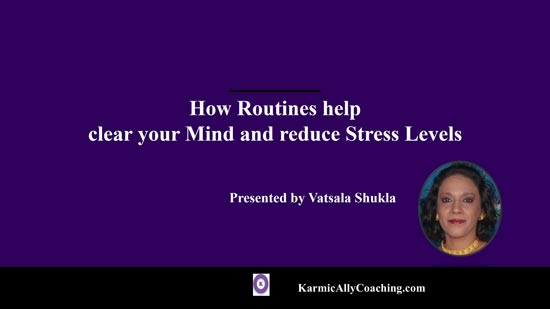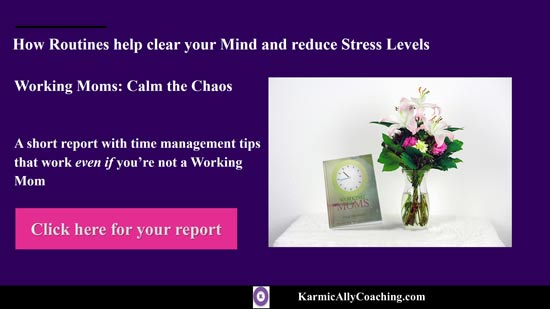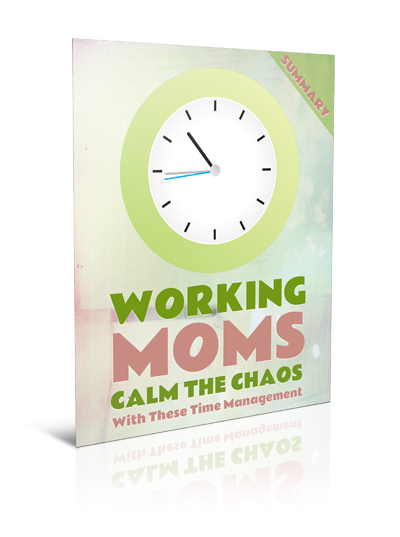This post has already been read 659 times!

Time Management skill is the one area where many professionals do not pay enough attention to. In fact poor time management skills lead to stress and overwhelm.
Whenever I ask any professional who is complaining of feeling stressed out, or burnout or even overwhelmed, I usually ask them, “How are you managing your time? Do you have any tools? Do you have any To Do Lists? Do you prioritize?”
Most of the time the answer is No. They’re just so filled up with their mind on the work that they have to do that they don’t actually sit down and try to work it out.
Okay, forget all the time management tools in the world but what about routines?
And then I have them saying to me ‘we don’t have any time for routines’.
But wouldn’t that help? It will.
Transcript:
Hi, I’m Vatsala Shukla Chief Encouragement Officer at Karmic Ally Coaching and today I want to do a short video to explain to you how routines actually help to clear your mind and reduce stress levels.
And I’m going to take a page out of my own book and share with you the story of my late dog Miss Coco and what she taught me about the Power of Routine.
Now when Miss Coco was around, we had a set fixed routine. We had a morning walk during which time she would walk and play a little and I would of course plan the rest of my day.
Then in the afternoons we went for long walks at which time we would do nature walking meditation.
We’d sit in the garden and again it gave me a chance to de-stress from the work that I would have been doing in between her morning walk and eating breakfast and the afternoon walk.
I learned the power of having a fixed routine and times to do those pieces of work. I could chunk time when I would actually do other work and fill up my timetable for the day and I used to be quite productive.
Now when I lost her a year ago, at that time I had not quite understood what she had taught me about routine.
It’s only when she wasn’t there that I realized that my time table was going haywire because I had forgotten how to fix specific times for different tasks and instead everything was on the To Do List. I’d just keep working on it through my priority, but the routine tasks started to falter. And that did create a lot of stress.
So, what I’d like to tell you is that routines are actually highly underrated.
In my case, the little dog taught me about it but even in the professional world, what happens is most people don’t understand the value of a routine.
In fact, most people who are portrayed in the media as having a good work ethic and who have high standards for their lives and environments are often being teased as being neurotic or obsessive over details that don’t seem to matter.
But, if you pay attention to the people around you, you’d find that the more organized you are, the more you are able to get accomplished in the least amount of time with the least amount of stress. In other words, organization matters.
But, I’ve also noticed that those people who are obsessively organized, they end up making a mistake which is they start sweating over the small details.
They go into the minutest of things thinking that a particular project or task is going to according to plan AND they forget to leave room for error and because of which they may become even more stressed out if things don’t go exactly according to plan.
In fact, they never have a Plan B.
They do not put in any mitigating factors that could prevent the task or work from going according to the way it should.
So, the act of getting organized and following the routine that you set for yourself is actually to reduce the stress in your life and not to cause it!
In other words, you need to always have a plan. You also need to think a little bit outside of that plan to see what can go wrong and what cannot.
Because, you know, when we talk about being organized, it’s actually very simple. It’s when you are doing the right things or habits within your day that ensure that things get done to the level that you need to do them.
It doesn’t mean that you’re cramming stuff for the sake of it. But you work systematically and you achieve things. And when you cannot do that, you’re going into stress and overwhelm.
But the good news is that there is a middle ground that we can utilize.
For one we have to be realistic in our goals. Secondly as I have been saying a lot in the last few minutes is to leave ourselves enough margin to easily overcome unforeseen bumps in the road. In other words, the roadblock.
If something goes wrong, can you mitigate the impact or can you pivot that?
Now always remember that while it’s important to stay flexible, it is also important to keep up on the habits and routines that you are creating.
In other words, once you create a routine, stick to it until it becomes a habit. Because the more times you do it, it’s going to become a natural part of you. When we build a habit, it is a way actually for our brains to get used to the new activity.
Of course it can be stressful at first, but ultimately it will become autopilot. I mean, do you need to practice the habit of breathing? It’s done on autopilot, isn’t it? Likewise here.
And this would take so much of the stress away from the activity itself because our minds already know what is coming and our bodies are used to the challenge, making it a comfortable part of daily life, even if the activity itself is not a particularly enjoyable one.
Like say, taking out the garbage, or answering emails, making client calls. Once you know you have a routine that you’re going to do things in a specific time and a specific way, it becomes much easier to manage.
And yes, good habits don’t have to be enjoyable for us to begin finding comfort in them.
Even doing unenjoyable things in a routine way can begin to feel satisfying.
And you can always feel a sense of accomplishment in doing them. In other words, when we remove them from the To Do List to the Done List, we are rewarded in our brains for the upkeep of a good habit, and once we get it over with then we don’t have to worry about it anymore.
Or at least not until the next time.
Because the truth is, it causes incredible stress to the body to dread activities that are a constant part of daily life.
And you know, bad habits like procrastination only assist in avoiding our doing things which we know we need to do and do not get rid of the task to be done. And for a bad habit to procrastinate, you can always figure out and justify in your mind why you shouldn’t be doing something but it is not going to really help.
In fact most times it is far healthier to accept that they are inevitabilities and to train ourselves to deal with them promptly and efficiently so that we can move on to doing the things we really, really enjoy.
Now I have a little resource for you.
This is a short report with time management tips that work even if you’re not a Working Mom.
In fact, I was inspired to write it for working moms for Mother’s Day this year and then I realized that this report works for others too.
I’m going to share a link below and I invite you to download it and to use the tips that are given in it.
It’s going to help you settle into good routines that will actually help beat overwhelm.
And my final words are, that you have to accept the things that you have to do and forming habits and routines around them will take the pressure off dread and anticipation.
It will free up your mind for things that really do matter. For example, spending time with your friends and family and getting your personal goals accomplished without having to take away time from other activities because you have to get your work done.
So I suggest that you embrace the power of routines today and download the Working Moms Calm the Chaos report pronto.
This is Vatsala Shukla for Karmic Ally Coaching. Have a great day. We’ll talk again soon.





 I adhere to the Certified Coaches Alliance Code of Ethics and Standards. A copy is available on request.
I adhere to the Certified Coaches Alliance Code of Ethics and Standards. A copy is available on request.
 Let's Talk through the Connect Form:
Let's Talk through the Connect Form: